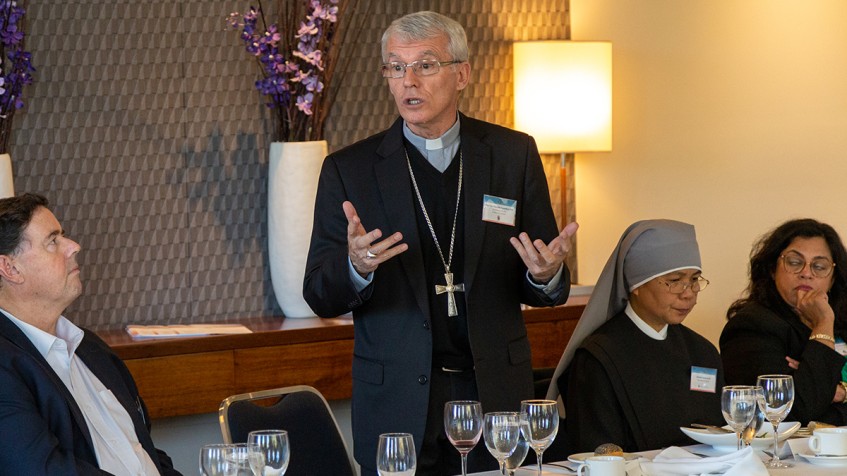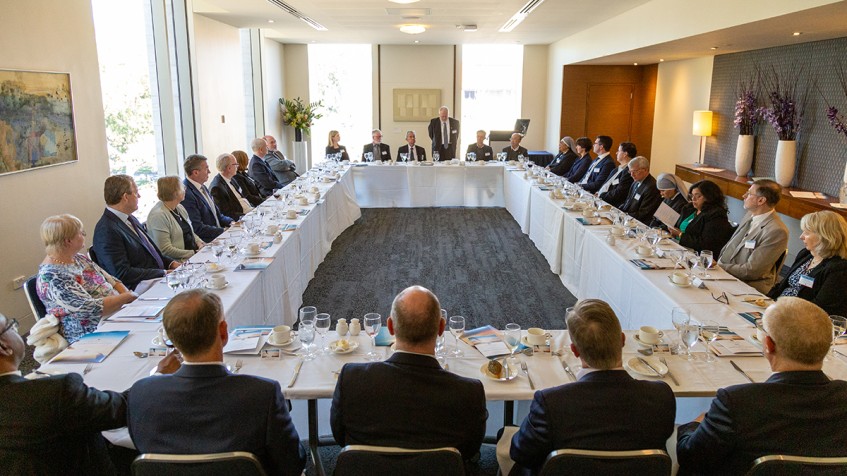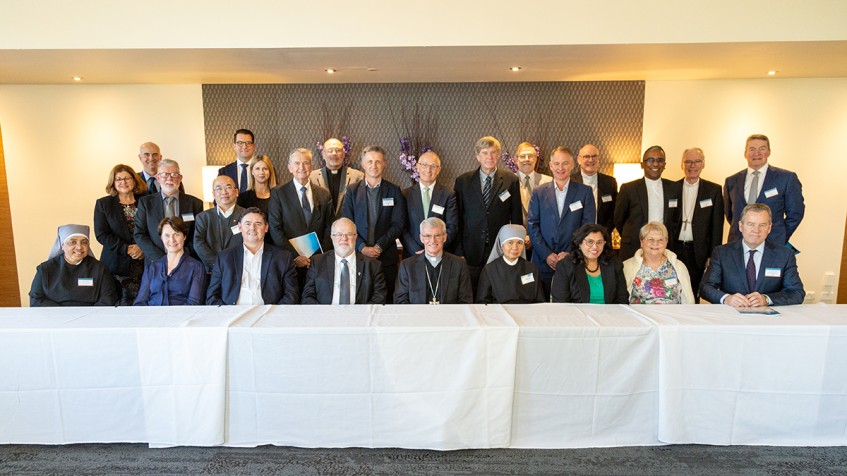VAD Legislation brings local Catholic healthcare sectors together

Perth Archbishop Timothy Costelloe SDB reiterated the stance of the Catholic Church on the issue of Voluntary Assisted Dying, and thanked Catholic aged care, health care, disability and tertiary sector leaders for their good work, at a luncheon held on 25 June. Photo: Jamie O’Brien.
By Amanda Murthy and Jamie O’Brien
Leaders from Western Australia’s Catholic acute, aged and disability healthcare sector have last month engaged in a special dialogue with Perth Archbishop Timothy Costelloe SDB.
The luncheon, organised by the Archbishop’s Office, provided the opportunity for Archbishop Costelloe to thank the various sectors for their work in the community, while also welcoming dialogue on the impending effects of the impending Voluntary Assisted Dying (VAD) legislation, which was scheduled to come into effect, Thursday 1 July.
The VAD legislation, passed by the Western Australian State Parliament in 2019 and enacted from Thursday 1 July, enables WA residents under certain specified conditions to access medication which is designed to end their life.
The leaders present for the luncheon, together with Archbishop Costelloe, Auxiliary Bishop Don Sproxton and Archdiocesan clergy, included representatives from the LJ Goody Bioethics Centre, Little Sisters of the Poor, St John of God Health Care, MercyCare, Catholic Homes Inc, Mount La Verna Retirement Village Inc, Southern Cross Care Inc, Identitywa and the University of Notre Dame.

Catholic Homes Chief Executive Paul Andrew, who was present at the luncheon with Archbishop Costelloe on 25 June, shared his experience and journey in dealing with the passing of the Voluntary Assisted Dying legislation, on 25 June. Photo: Jamie O’Brien.
Throughout the course of the luncheon, each organisation leader and representative had the opportunity to share their insights and experiences of the impending implementation of the VAD legislation, highlighting their journey and insights of the operational factors.
Catholic Homes Chief Executive Paul Andrews, responded to The Record in relation to the effect the legislation has had on the not-for-profit aged, home, community care and retirement living provider, and some of the ways that they have maintained the best quality care for their residents.
“While Catholic Homes cannot comment on the experience of other agencies or aged care providers, our journey is ongoing and remains firmly based on our Catholic values of joy, love and hospitality and a commitment to respectful, open communication,” Mr Andrew said.
“Our staff cannot provide, facilitate or participate in VAD, but we will respond compassionately and respectfully to the person requesting VAD and always demonstrate our values of care and respect.
“We will not abandon our residents and clients and we will strive to provide the best possible services to ensure a full continuum of care before and after death,” Mr Andrew added.
“Through ongoing training and communication, we seek to ensure that our staff and volunteers understand what VAD is, our position regarding it and how to respond to requests for VAD.”

The group present at the luncheon with Archbishop Costelloe, took turns to share their insights and experience dealing with the newly imposed Voluntary Assisted Dying legislation, on 25 June. Photo: Jamie O’Brien.
Mr Andrew, who Chairs the Archdiocese VAD Steering Committee, added that at the forefront of Catholic Homes mission is to deliver their clients and residents with the best care.
“The best care is one which provides comfort and support in accord with their wishes, which meets community standards for quality, while upholding and respecting the sanctity of life,” Mr Andrew concluded.
In his in-depth VAD Pastoral Letter published on 23 June, Archbishop Costelloe spoke about the need to support, through prayer and encouragement, all those who are engaged in the healing and caring ministry of the Church.
“Our Catholic hospitals, our Catholic aged-care facilities, our Catholic nursing homes and our Catholic Social Outreach agencies are already committed to being places of compassion, of healing, and of hope.
“With the legalisation of VAD, the witness of all these wonderful institutions to the Catholic understanding of the dignity and sanctity of every human life will become even more important. “It will also become more challenging.”
